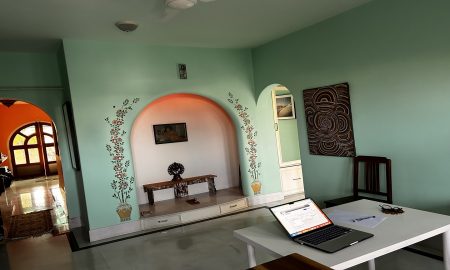The last acting job I had was on Late Night with David Letterman. A few months shy of my fiftieth birthday, I walked into the Ed Sullivan Theater to do my taped skit, playing Jimmy the bartender with Alan Kalter, the announcer on the show. Letterman always kept the theater so cold that you could almost see your breath. I said hello to the crew, went to hair and makeup and walked on the set. I felt at ease in my body. This was my vocation; the work I had done for thirty-seven years. The director and I joked with each other and talked about the scene in a kind of verbal shorthand, “more gruff, lean in, lighter on the last sentence.” I knew what he wanted and felt at home in front of the camera. Then it was over. I did my scene in a few takes, cleaned off my makeup, walked to Ninth Avenue and got a cab home. I was finishing graduate school for social work, exploring a new calling. I was unsure where it would take me. On the cab ride home, I felt like I had left a part of myself in that theater, some vital organ, one of my five senses. I felt conflicted at the thought of leaving my vocation for an unknown future. It was like walking into a play without a script. Acting was more than a choice I made long ago. It had helped me find myself and a place in the world.
In September of 1969, I stepped off the school bus in front of John Muir Junior High School. The air smelled of newly mowed grass and the sunlight reflected in crystal shards from the school windows. I took in the paneled walls, pale orange and sea green, like a checkerboard. The school was much larger than my elementary, filled with children from surrounding districts. I was ill at ease. Playing games and making friends was easy in elementary school—dodgeball played on faded, hot asphalt in the bright California sun, the laughter and ease of kickball at recess. I knew things would be different in my first gym class, where each boy’s performance was measured: how fast he could run, how long he could jump, how quickly he could swim, how much he could lift. I loved sports but was not athletic, and I remember standing in line at the pool, my thin body pressed against the pale blue gym building wall, the clear green water reflected in a hundred shimmering sparkles from the afternoon sun. I could feel the shrinking shame as each name was called out and placed in a pecking order, from fastest to slowest, from strongest to weakest, from best to worst. I was exposed; there was no way to hide the fact that I did not belong with those who were destined for all good things in the year ahead and the life beyond.
Two years later it was obvious to me that I was a fish out of water, I was a nobody, a non-entity. Neither athletic nor a scholar, I was low on the food chain. The last one picked for games and never invited to parties. School dances were a torture, standing next to a gym wall for hours, terrified to ask girls to dance, while the Jackson Five sang “I’ll Be There”. I could sing, and was in the school choir, but that offered little in the way of social interaction. I did not belong to the same world as other kids in my school. Children whose families weren’t poor, had brothers that weren’t constantly getting arrested. Much worse, I felt that other children had parents that knew how to navigate the world—parents who belonged to a country club, knew when to wear a suit for an interview. My classmates and their parents seemed to have some idea about where they wanted to go with their lives. Whatever was out there I had no idea, but I knew my parents couldn’t get me there. They had little knowledge of the world outside of church.
As time wore on, classmates picked up on my lack of social skills and savvy and singled me out for bullying. My story is not much different from many others, except that I didn’t fit in at home either. Born out of wedlock and adopted into my stepfather’s family, I was viewed as an outsider, an outlier in their tightly knit Italian brood. I was miserable in both worlds and had to get out. Insecurity and loneliness wrapped around me like a wet blanket and I couldn’t figure out how to take it off.
In the early summer of 1971, my mother, on the advice of my English teacher, took me to audition for a summer stock production of The Pajama Game, produced by San Jose Music Theater. The theatre was hot and airless in the summer heat. I walked onto the stage, the radiance of the Leko lights illuminating the worn wood floor and blinding me to the empty red velvet seats behind the orchestra pit. A piano player sat alone on the stage, a bendable, chipped black lamp resting on top so he could read music. He took my sheet music and I walked to the center of the stage.
“Name?” a disembodied male voice called from the audience, authoritative but not harsh.
“Mike Cannistraci,” I replied.
“Ok, Mike, what are you going to sing for us today?”
I told him I was going to sing “Hey, Look Me Over.”, a snappy up-tempo song from a musical with Lucille Ball. I nodded to the piano player and began to sing. I know I was nervous, but I felt so at home on that stage, that feeling melted away. I sang out, unafraid, into the darkness beyond the stage. The circle of light felt like the safety of a womb. It was wonderful. I felt free.
I was cast in the chorus and told to show up for my first rehearsal. It was a dry, hot day in June when my mother drove me to the office and rehearsal space on North First Street in downtown San Jose. San Jose in the early 1970s was not yet the hub of Silicon Valley, filled with trendy bars and chic clothing stores. The rehearsal space was an open warehouse, with large sliding metal doors for moving set pieces and props. We passed the Orange Julius store, with peeling orange paint and cashiers taking money and handing out drinks through a dirty sliding glass window. A rescue mission was across the street, the neon sign above the door missing the V, E and S to spell out JESUS SA. Homeless men, all in the same dusty, torn clothes, slumped on the sidewalk, waiting for a meal. I had seen these men as a young child, when my father would drag me to rescue missions to listen to him talk about God’s saving grace. I felt some unease, walking in this sketchy neighborhood after my mother dropped me off, but I had to take the risk. I needed to get out of the life I was living.
I walked into an open rehearsal hall to the sound of piano music, loud laughter and a jumble of conversations. The cast filled the room, and the energy was thick and almost tactile. I could feel it humming into my body. The musical director and choreographer stood in deep conversation off to the side. Someone called out for the cast to sit down and we sat in groups around the space. Then George came out of a side office and walked to the center of the room.
George was an awesome, sometimes terrifying presence. He was medium height, somewhere in his forties, his light brown hair touched with blond from the sun. I learned later it was a toupee. He was Portuguese- American with piercing green eyes and a hawk-like nose. He could freeze you with a glance. He was a brilliant director and the artistic fulcrum of all of San Jose Music Theater’s productions. He would later in my life become a mentor, teacher, and almost mythic figure in my life. He scared the living hell out of me.
Rehearsals began. The old-fashioned sides were handed out with the script. A side only had your dialogue on it, and I was confused as to how actors understood what was going on in the play. The whole rehearsal process made me nervous; it was akin to waking up on another planet. But gradually, I began to understand the play as it formed in front of my eyes. I understudied a kid who had only one line and everyone thought that was hysterical.
We began to learn the choreography and I learned quickly that I was a pathetic dancer-awkward and klutzy and barely able to do a simple box step. However, something began to happen. Despite my awkwardness, my deer-in-the-headlights innocence, I was accepted, and the other kids seemed to like me. Some of them were obviously gay and lesbian and most were a little weird in one way or another, me included. However, no one was judged or excluded. They invited me to pool parties and took me home after rehearsal, they helped me with my dance steps and with learning songs. I had the feeling for the first time of being accepted by a tribe, both the older teenagers and those my age. I clung to that feeling.
We rehearsed and rehearsed and rehearsed and then rehearsed again. I loved it. Rehearsing, I learned, stopped the constant chatter of the fascist, bullying gym teacher that lived in my head. It shut out that feeling of otherness, of being one of life’s losers, that made me so self-conscious I wanted to crawl down a dirt hole and never come out. During rehearsals, I had an independence from my family I had never had before. Theater was so time-consuming and all-consuming that I would come home, eat, go to bed, then get up to rehearse again. I had never felt so free in my short life. I dreaded September and returning to my second-class existence and the feeling of not belonging.
George directed and staged the show with a mix of charm and intimidation, He flirted subtly with the older boys, but no one seemed to mind. I think we all wanted male attention. He never looked at me and I was too terrified of him to get too close. “When are you going to learn that goddamn dance step? Slide, toe step,” he would hiss at me. Still, I was in awe of how he shaped and formed the show. Mesmerized by the older cast leads, I longed to be able to dance and sing so effortlessly on stage.
I became friends with an older lady, Joanie, who worked backstage and was a kind of helper to George. I would spend my downtime sitting with her. She had a round, open face with large brown eyes that crinkled when she laughed. Her gray-blond hair was short-cropped, and she wore sleeveless plaid cotton shirts, worn jeans and diesel boots that made her look like a pixie oil rigger. She didn’t have a car and I would ask my mother to pick her up for rehearsals. My mother wasn’t thrilled with this and I would often have to wheedle and plead. We would pick Joanie up at her home on the poor side of town. Her wood clapboard house with the porch peeling gray paint looked lonely. The screen door was torn and blowing in the wind, the lawn was dried brown grass and weeds a foot high and the black asphalt driveway was cracked with holes. Joanie ran out barefoot on the hot cement. My mother would glare out the window, “Look at her, she ain’t even wearing any damn shoes!” I hushed her and told her to be nice. I felt in some soft part of my body that Joanie was sad, her heart, somehow broken. I had never met a lesbian, but I liked her so much, I told her funny stories and would do impersonations of my evangelical uncles, which would make her laugh in a cracked voice. Years later, she told me that the woman she had loved for seven years had left her early that summer, and that I was a light and balm to her, naïve and with no agenda. For the first time, I was opening up to a world without my adopted family. I was choosing my own tribe, and Joanie was a glimmer of the family to come.
My mother had the rare gift of giving me the worst advice. Opening night was a week away and we began tech rehearsals—the long slow process of setting up light cues, set movements and sound checks. On the second day of tech rehearsal, my mother told me that I should stay home, that she missed me, and she was sure if I missed one rehearsal it wouldn’t be a big deal. Since she was the adult, I figured she knew what she was talking about. I came to rehearsal the next night and walked into the backstage dressing room. Everyone avoided eye contact with me and then I heard George bark my name. My chest tightened and I flushed red, unable to breathe.
“Where the hell were you last night?” he shouted in a voice that echoed in the large room.
I lied as quickly as I could. “My brother was sick; we took him to the hospital.” George glared at me; I knew he could tell I was lying.
“Never do that again” he hissed and walked away.
One of the older girls sat by me as I put on my makeup. She touched my arm gently like it was burned and blistered. “Mike, you can never miss tech rehearsal.” Lesson learned.
Opening night. I remember the oiled smell of makeup, the air filled with the sharp, alcohol smell of hairspray, the heat of dressing room lights, the rustle of costumes being put on, singers doing warm up exercises. The orchestra tuned in mixed harmony with the chatter of voices and energy thick in the air. My body was humming. I don’t remember being afraid, although this would be my first time on stage in a musical. Somehow, being in the chorus felt safe, like being one fish in a school of hundreds. I still felt the intoxication of applause, the fire that entered my body at that sound. I didn’t know that fire would become a living part of my being from that moment on, that I would invest all my energy and sense of self into feeling it burn through me. I was hooked. I knew this was who I wanted to be.
The play ended and it was time to return to my life, the dreariness and abuse of home and the constant bullying at school. The ninth grade was to be one of my worst years, but a door was now cracked open to another world. Despite my bad dancing and awkward shyness, I had found another kind of family. I was saved by theatre and that charmed circle. Gay and straight misfit children finding a home—a place to fit, a place to belong. They had extended a hand of acceptance and friendship to me and invited me to join them.
The cab drove up Broadway. It had begun to rain, and the neon lights shimmered in puddles on the street. I wouldn’t know then, but that night, after the Letterman taping, I was making a final stage exit. At age fifty, I was leaving this career that had given me so much joy for one that would give me a different meaning. Being an actor had been my life. Still, I needed to be a therapist. I wanted to work with a person during the arc of their growth in the same way I had worked to create the arc of a character. Almost four decades had passed and I had made too many stage entrances to count. Now I was two months from graduating with no clear idea of my next step. I had no script to follow but acting had taught me the power in making a committed action. I couldn’t see what lay beyond these unfamiliar footlights. Trusting myself, I stepped into my second act.
***
Image by freestocks-photos from Pixabay





